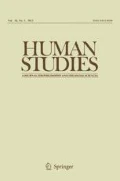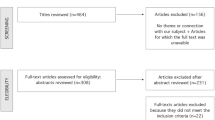Abstract
The paper explores Wittgenstein’s notion of grammar in the sense of a discipline or an activity, as opposed to the object sense of the term (grammar as a body of rules for the use of a language). I argue that the Wittgensteinian activity of grammar consists in giving expression to rules of our language use. It differs from the traditional grammarian’s activity not only in focusing on a different type of rules, but also in that it does not aim at an explicit and exhaustive treatment of a specific domain of language. Instead, Wittgenstein conceives its goal as therapeutic: the dissolution of particular philosophical problems. Further, I attempt to reconcile his seemingly contradictory remarks on the character of grammatical statements, defining the senses in which they respectively can, and cannot, be considered descriptive assertions. I confront G. P. Baker’s and P. M. S. Hacker’s conceptions of the Wittgensteinian grammatical activity and I argue in favour of the former. Finally, I critically examine N. Garver’s claim that Wittgenstein, in his later conception of philosophy as grammar, succeeded in formulating a successfully self-referential criterion of philosophical critique. I also argue that grammatical activity, despite Wittgenstein’s overt commitment, is in fact not the only method of his later philosophy.
Similar content being viewed by others
Notes
However, I will avoid reference to the late work On Certainty (OC), where the role of the notion of grammar is highly uncertain. Contra Moyal-Sharrock (2004), who takes all of the “objective certainties” discussed in the book to be of grammatical character, I would argue that the book itself provides little evidence for such a general claim. It can only be safely said that a part of “objective certainties” is constituted by what Wittgenstein would have called “grammatical statements” earlier. Explicit references to grammar are so rare in this work that no conception of it can be reconstructed on that basis, and it would be unwise to let the supposed close affinity of certainty to grammar form our notion of the latter in later Wittgenstein generally.
According to PG, I, 14, it is misleading, a part of “a mythology of symbolism;” to treat the rule of double negation on a par with empirical sentences such as “und zwei solche Pferde können den Wagen fortbewegen,” where the meaning of the employed words is independent of the asserted fact.
Unless stated otherwise, any italics in quotations in this paper are original.
For an interpretation of Wittgenstein’s way from logic to grammar, see 1996: 141–147.
BT, 58: “Was versteht man unter ‘allen Regeln des Tennisspiels’? Alle Regeln, die in einem bestimmten Buchen stehen, oder alle die der Spieler im Kopf hat, oder alle die je ausgesprochen wurden, oder gar: alle die sich angeben lassen?!”
Notably in rules that do not even constitute the meaning of any expression, as Wittgenstein apparently also admits (Kuusela 2006: 315 in a footnote).
In nouns, for instance, only those cases are distinguished that are formally marked, possibly in another nominal domain (hence accusative case in English, which is only marked in personal pronouns), or even in another language or some historical stage of the current one (hence the occasional talk of dative or genitive in English, influenced by the Latin grammatical tradition).
See Kambartel and Stekeler-Weithofer’s (2005: 100–131) forceful argumentation against such an opinion.
In the sense of grammar-discipline, that is, statements of the Wittgensteinian grammarian. Note that throughout the present section, “grammatical” is used in this, less ordinary sense, not in the usual sense of being licensed by rules of some grammar.
BT, ch. 58: “Und nun sagte Einer: Das Spiel ist ja nicht geregelt, denn, wenn Einer den Ball so hoch wirft, dass er nicht wieder auf die Erde zurückfällt, oder so weit, dass er um die Erde herumfliegt, so wissen wir nicht, ob dieser Ball als ‘out’ oder ‘in’ gelten soll. Man würde ihm—glaube ich—antworten, wenn ein solcher Fall einträte, so werde man Regeln für ihn geben, jetzt sei es nicht nötig”.
Baker and Hacker (1985, ch. Philosophy and Grammar): “[T]o insist that rules for the use of expressions are correctly given by mentioning rather than using the word [\(\ldots \)] is patently false”.
Such a distinction of “surface” and “depth” grammar thus precisely mirrors the opposition of “grammatical syntax” and “logical syntax,” as envisaged by Carnap 1931.
In a certain political context, a statement about someone’s colorless green ideas sleeping can amount to a perfectly understandable insult.
“Wenn wir nach der allgemeinen Satzform fragen -, bedenken wir, dass die gewöhnliche Sprache zwar einen bestimmten Satzrythmus, Satzklang hat, dass wir aber nicht alles, was ‘wie ein Satz klingt’ ‘Satz’ nennen.—Daher spricht man auch vom sinnvollen und unsinnigen Satz. // Anderseits aber ist dieser Satzklang dem was wir in der Logik Satz nennen nicht wesentlich. Der Ausdruck ‘gut Zucker’ klingt nicht wie ein deutscher Satz, kann aber doch sehr wohl den Satz ‘Zucker schmeckt gut’ ersetzen” (PG, I, 78).
Also worked out by McGinn (2001).
Another question is whether grammatical statements can break crude syntactic rules of common speech. Wittgenstein’s hardly ever do.
Metaphysical in Wittgenstein’s sense: concerned with how things must be, without realizing the grammatical character of such asking. See O’Neill 2001, part B.
‘‘Wir verwarfen nur die Grammatik, die sich uns hier eindra¨ngen will’’ (see PI, 303).
References
BT (Big Typescript) = Wittgenstein, L. (2002). “The big typescript”. Wiener Ausgabe, Band 11. Michael Nedo (Ed.). Frankfurt am Main: Zweitausendeins.
PG (Philosophical Grammar) = Wittgenstein, L. (1984). Philosophische Grammatik. Werkausgabe Band 4. Rush Rhees (Ed.). Frankfurt am Main: Suhrkamp.
PI (Philosophical Investigations) = Wittgenstein, L. (1999). Philosophische Untersuchungen. Werkausgabe Band 1: Tractatus logico-philosophicus; Tagebücher 1914–1916; Philosophische Untersuchungen. Frankfurt am Main: Suhrkamp.
OC (On Certainty) = Wittgenstein, L. (1970). Über Gewissheit. G. E. M. Anscombe und G. H. von Wright (Eds.). Frankfurt am Main: Suhrkamp.
TLP (Tractatus Logico-Philosophicus). Wittgenstein, L. (1999). Tractatus logico-philosophicus. Werkausgabe Band 1: Tractatus logico-philosophicus; Tagebücher 1914–1916; Philosophische Untersuchungen. Frankfurt am Main: Suhrkamp.
Baker, G. P. (2001). Wittgenstein’s ‘depth grammar’. Language and Communication, 21, 303–319.
Baker, G. P., & Hacker, P. M. S. (1985). An analytical commentary on the Philosophical Investigations, vol. 2: Rules, grammar and necessity. Oxford: Basil Blackwell.
Brandom, R. (1998). Making it explicit. Reasoning, representing and discursive commitment. Cambridge: Harvard University Press.
Bennett, M. R., & Hacker, P. M. S. (2003). Philosophical foundations of neuroscience. Malden, MA: Blackwell.
Carnap, R. (1931). Überwindung der Metaphysik durch logische Analyse der Sprache. Erkenntniss, 2(1), 219–241.
Forster, M. N. (2004). Wittgenstein on the arbitrariness of grammar. Princeton: Princeton University Press.
Garver, N. (1996). Philosophy as grammar. In H. D. Sluga & D. G. Stern (Eds.), The Cambridge companion to Wittgenstein (pp. 139–170). Cambridge: Cambridge University Press.
Hacker, P. M. S. (2012). Wittgenstein on grammar, theses and dogmatism. Philosophical Investigations, 35(1), 1–17.
Hagberg, G. (2003). On philosophy as therapy: Wittgenstein, Cavell, and autobiographical writing. Philosophy and Literature, 27, 196–210.
Kambartel, F., & Stekeler-Weithofer, P. (2005). Sprachphilosophie. Probleme und Methoden. Stuttgart: Reclam.
Kuusela, O. (2006). Do the concepts of grammar and use in Wittgenstein articulate a theory of language or meaning? Philosophical Investigations, 29(4), 309–341.
McGinn, M. (2001). Grammar in the Philosophical Investigations. In O. Kuusela & M. McGinn (Eds.), The Oxford handbook to Wittgenstein (pp. 646–666). Oxford: Oxford University Press.
Moyal-Sharrock, D. (2004). Understanding Wittgenstein’s On Certainty. Basingstoke: Palgrave Macmillan.
Mulhall, S. (2007). Wittgenstein’s private language: Grammar, nonsense and imagination in Philosophical Investigations, §§243-315. Oxford: Clarendon Press.
O’Neill, M. (2001). Explaining ‘The Hardness of the Logical Must’: Wittgenstein on grammar, arbitrariness and logical necessity. Philosophical Investigations, 24(1), 1–29.
Rorty, R. (1979). Philosophy and the mirror of nature. Princeton: Princeton University Press.
Acknowledgments
I owe thanks to Martin Stokhof and to two anonymous reviewers, who all provided valuable comments on this paper. All mistakes and omissions are solely my responsibility. I am also grateful to the Dutch Nuffic for their support of my past studies in the Netherlands. Work on this paper was supported by the Research Grant No. 13-21076S of the Czech Science Foundation
Author information
Authors and Affiliations
Corresponding author
Rights and permissions
About this article
Cite this article
Ocelák, R. Giving Expression to Rules: Grammar as an Activity in Later Wittgenstein. Hum Stud 37, 351–367 (2014). https://doi.org/10.1007/s10746-014-9314-4
Published:
Issue Date:
DOI: https://doi.org/10.1007/s10746-014-9314-4




